
They do not pay themselves a salary, and there’s no formal entity distinction unless registered as an LLC. Understanding these differences can help you strategically position your business to maximize the QBI deduction before it potentially sunsets at the end of 2025. The rules around the Qualified Business Income Deduction 2025 vary depending on whether your business is a sole proprietorship, LLC, or S-Corporation. Planning these elements ahead of time can improve your eligibility and increase the deduction amount under the Qualified bookkeeping and payroll services Business Income Deduction 2025 rules.

Compliance: Forms and IRS Guidance
Eligibility hinges on owning or being a partner in a qualified pass-through entity, not simply providing services or receiving guaranteed payments. Even some trusts and estates may qualify, but income types like investment income or non-business interests won’t count. This distinction often surprises taxpayers who assume all self-earned income automatically qualifies for the 20% deduction. A taxpayer’s total taxable income influences the amount of Qualified Business Income that qualifies for the deduction. The deduction is subject to limitations based on taxable income, calculated before considering the QBI deduction itself.
Client Accounting Services

Therefore, you must track each category of loss or deduction until the loss or deduction is no longer suspended. In some cases where you have multiple businesses being reported in a given year the qualified business income will end up being a negative value after you net the total amount of QBI from all businesses together. You will be required to take that negative amount of QBI and carry it forward it to the next year which will end up reducing the amount of QBI deduction you may be eligible to take in a future tax year. For tax years beginning in 2024, you can potentially claim first-year Section 179 deductions of up to $1.22 million for eligible asset additions (subject to various limitations). For eligible assets placed in service in 2024, 60% first-year bonus depreciation is available. A single-filing taxpayer in 2025 has a taxable income threshold of $197,300, with a phase-out range up to $247,300.
QBI Deduction for Self-Employed Individuals

For purposes of qualified business income deduction: determining your UBIA for all qualified property, the unadjusted basis immediately after acquisition means the basis on the placed-in-service date. The depreciable period ends on the later of 10 years after the property is first placed in service by you or the last day of the last full year in the applicable recovery period under section 168(c). Additional first-year depreciation under section 168 doesn’t affect the applicable recovery period.
- Then add their sum to anything you need to carryforward from the prior year, and multiply the total by 0.2 to give you the number you’ll list as 20%.
- You must complete Part I if you have QBI from a qualified trade, business, or aggregation.
- Because H and W’s taxable income is between the lower and higher thresholds, and they have a business that is a specified service trade or business, H and W must calculate their specified service trade or business limitation phase-in.
- If your business falls into the SSTB category, your ability to take the QBI deduction phases out once your income passes a certain limit, which we’ll cover below.
- If you received dividends from a real estate investment trust (REIT) or income from a publicly traded partnership (PTP), that income is also used to calculate your pass-through deduction.
- Form 8995-A, Part III, Part IV, and Schedule A (Form 8995-A) each ask for your taxable income figured without regard to the QBI deduction.

This is further reduced by Net Capital Gains, including Qualified Dividends. The permanent nature of the QBI Deduction allows for more confident long-term tax planning strategies. Executors and Trustees can make better decisions on distributions to beneficiaries in accordance with the terms and provisions of the trust. Beneficiaries that are distributed Taxable Income may be eligible to claim the QBI Deduction and potentially further benefit from aggregation.

Given the gridlock in Congress today, you can’t count on an extension, so small business owners should take advantage of this tax break before it expires — or risk losing it forever. To discuss the complex rules for claiming QBI deductions and plan how to get the best overall federal income tax results in your situation, contact your tax advisor, or reach out to the GRF Tax Team. The limitation based on the UBIA of qualified property is intended to benefit capital-intensive businesses, such as manufacturers or hotels. Qualified property means depreciable https://radio.lev.edu.ec/index.php/2025/03/13/what-is-trade-accounts-payable-and-why-is-it/ tangible property (including real estate) that’s owned by a qualified business and used by that business for the production of QBI. The UBIA of qualified property generally equals its original cost when it was first put to use in your business. There are six main scenarios for the activity by activity level deduction with regard to the phase-in of the wages/property limits, phase-out of the credit, and if it’s a specified service business.
